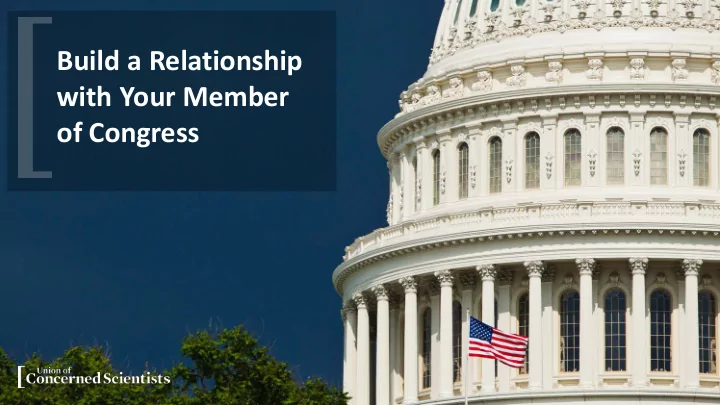

Build a Relationship with Your Member of Congress
Pamitha Weerasinghe Washington Representative Clean Vehicles Program PWeerasinghe@ucsusa.org Liz Schmitt Senior Outreach Coordinator Federal Defense Campaign LSchmitt@ucsusa.org
Agenda in Brief 1.Who does Congress listen to? 2.How does Congress operate? A. Congress listens, now what? B. What is Congressional Oversight? 3.What can you do to be heard by Congress?
Who Does Congress Listen To? (in general) Constituents
Who Does Congress Listen To? (in general) Academia NGO/Industry Federal Agencies Constituents Scientific Studies Internal research Scientific Studies On-the-ground • • • • Research Papers Coalition views Research Papers impacts of policies • • • Expert opinions Expert opinions Expert opinions More questions than • • • • Demonstrations Media comments Demonstration answers (in general) • • • Long-term discussion Real world examples projects “Hey, guess what I • • • of effects Low to high levels of Agency views just heard?” • • Focused on science detail Focus on federal • • High level of detail Focus on needs • • Research agenda membership / Leadership / • • funders Administration Advocacy agenda Agenda •
How Does Congress Operate? Hearings Legislation Oversight
Congressional Oversight (generally) • What is it? • Committee Jurisdiction over Federal Agencies • Responsible for overseeing activities and monitoring for waste, fraud, or abuse
Congressional Oversight (generally) • When is Oversight conducted? • Always. Oversight is(or should be) politically agnostic. • How does Congress Conduct Oversight? • Internal process • Often conducted outside the public view
Tools of Congressional Oversight • GAO Reports • Letters to Agencies • Congressional Hearings • Subpoenas • Depositions / Transcribed Interviews • Staff report (usually concluding oversight work)
Communicating to Congress (and where do I fit in?)
Briefing Congressional Staff (or anyone, really)
• Know Your Audience • Who are you meeting with? • Do they have specific knowledge or interest? Briefing • Ask questions of staff Congressional • Staff are eyes and ears of the Member Staff • Relate Specific Findings • The reason you are in the room • Connect dots efficiently (less is more, unless more is required) • Tell a story
• If X, Then Y, But also Z • Drive the conversation, don’t just participate Briefing • If you have a specific request, make it Congressional Staff • Always better to be direct than vague • Maximize opportunity for follow-up • Time is valuable, no one wastes time
• Don’t get discouraged • 7 Congress Rule (that’s a LONG time!) • Meeting with Staff is just as, and Briefing sometimes more, valuable than meeting with your Member directly Congressional Staff • Continue to educated new staff, develop relationship with office. • Establishing individual credibility • Help develop institutional knowledge on issue
Q & A
Are you a scientist, engineer, or technical expert? @SciNetUCS ScienceNetwork@ucsusa.org
Not a scientist? We need your voice too! www.ScienceChampions.org @UCSUSA
Stay connected! Text ENGAGE to 662266 Get the latest updates on hearings and opportunities to act
Thank You!
Recommend
More recommend